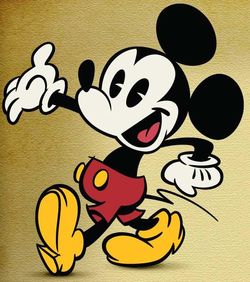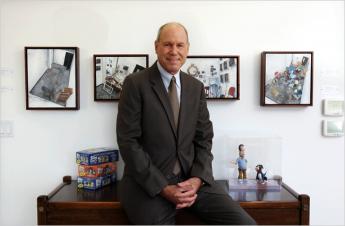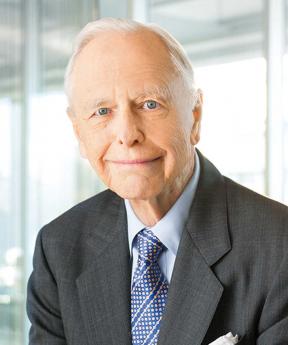Related Topics
Conventions and Convention Centers
When you have a big convention center, some circus is always coming to town. Philadelphia has always been a convention town, has had and still has lots of convention sites, and hopes to have more of the kind of famous convention we have had in the past.
Favorite Reflections
 In no particular order, here are the author's own favorites.
In no particular order, here are the author's own favorites.
Philadelphia's Fourth Century: Revival or Relapse?
Novelists, sociologists, playwrights, financiers, historians, poets -- and others -- have described and explained the rise and fall of Philadelphia. Each of them is a little bit right, and a little wrong. Philadelphia is hidden, but it isn't hiding.
Barbarians At the Gates of the Magical Kingdom

|
| Mickey Mouse |
The Walt Disney Corporation held its annual stockholder meeting on March 3, 2004, in Philadelphia's Convention Center. There were only five items of business: the re-election of directors (no names on the ballot in opposition), re-appointment of the auditors ( reappointed every year for twenty-eight previous years), and three stockholder proposals ( overwhelmingly defeated several times in the past). Typical stockholder meetings leisurely dispose of such an agenda in about twenty minutes. This one took seven hours.
There could well have been two unstated reasons for the protracted meeting. The first would be self-inflicted: direct advertising to thousands of small stockholders at an entertainment, including costumed cartoon characters, movie excerpts promoting coming attractions, and a chance at the microphone to tell the world who you are and what you think. Such promotion is even more effective if the meeting city shifts each year.
This year it was Philadelphia's turn to see the sights, including top executives in new suits and Ronald-Reagan shirt collars. Several thousand true believers in the American Dream did show up, many of them bringing little children, taking almost three hours to get through an airport-like electronic frisking by four harried security guards. The guards seemed particularly concerned to prevent live cell phones from entering the meeting.
Secondly, the meeting gave all the signs of a covert filibuster. It even had a professional: Senator George Mitchell, the former Democratic majority leader of the U.S. Senate, was on hand to advise. After all, a frivolously protracted meeting is collapsible if discussions get out of hand, because the audience has already become impatient. Comcast, with corporate headquarters only three blocks from this Convention Center, had an active offer to acquire Disney, instantly rejected by the Disney board. As soon as the offer was announced, the price of Disney stock jumped four dollars a share, enriching every shareholder in the room a collective $8 billion. Why not accept it? The new price now made the offer seem too low, by some perplexing reasoning. Allowing a succession of irrelevant speeches positions the chairman of the meeting to smother, in the interest of fairness to all, and gathering momentum for Comcast. In the event, it did actually delay this meeting's announcement of voting outcome, which was called for 8 AM, until past the close of the New York Stock Exchange in the late afternoon. Meanwhile, the message was encouraged that love of cartoons, wholesome television, and family vacations was more appealing to true stakeholders of Disney than vertical integration and short-term (read, short-sighted) profits.

|
| Michael Eisner |
It didn't go that way; hardly a word was said about Comcast. Instead, the true believers, led by the nephew of Walt Disney, made it clear that they were turned off by speeches filled with business school lingo, like enhancing the brand, protecting the franchise, and growing the business. They didn't understand all that, but they did understand that the American heartland was being asked to pay eight and nine-figure incomes, year after year, to people who obviously worshiped in the financial cultures of the East and West coasts. The most telling remark was that the company had good years and bad years, but Michael Eisner the CEO -- never seemed to have a bad year. Stockholders were urged to withhold their votes from him.
To some extent, any management engaged in a proxy battle has some justification for limiting the attendance at a stockholders meeting, because arbitragers will almost always try to support a hostile proposal. Stockholders who bought their shares a few days before the vote have interests which conflict with the long-term stockholders since a short term jump in stock price will probably evaporate if the proposal is defeated. Many of the people in the audience are only there to assess whether the proposal is likely to be successful, so as to buy more shares or sell what they have; some of the people at the microphone are potentially interested only in misleading these observers. The wise guys in the audience were agreed that Comcast had made a mistake announcing its offer after the date had passed when newly-purchased shares were eligible to vote.
In the end, over a thousand people stuck it out to hear the ballot results. After seven hours, someone moved for adjournment, the chairman heard a second, a scattering of eyes followed, and he never called for the nays. He was half-way to the door when a thousand howls were raised, demanding the results of the vote. Oops, sorry. An accountant was summoned to drone out interminable numbers, one by one. It seems that seven hundred million shares had withheld approval from the CEO, 43% of the votes cast. Mr. Eisner, to his credit, didn't show a flicker of emotion on his televised face, and duly announced that all directors had been re-elected, the auditors re-appointed, and the stockholder resolutions defeated. Maybe so, but at the board reorganization meeting which followed, Eisner was removed from the Chairmanship although retained as CEO. The more logical person to defend the Magic Kingdom against predator Comcast was Roy Disney, of course, but to appoint management's public enemy would have been a bit much. Almost all of the board had themselves experienced at least 200 million votes withheld.

|
| Ned Johnson |
The real governance crisis which this carnival dramatizes was not mentioned. With nearly two billion shares outstanding, at $26 a share this company is valued at $52 billion. There were people at the microphone who owned 200,000 shares, but even their economic power is negligible in a corporation so large. It is the managers of mutual funds and pension funds who now control big-corporation voting, and have the real power to decide on mergers and take-overs. Mutual funds and pension funds, like Ned Johnson at Fidelity who controls a trillion dollars of various stocks, are the ones with the votes. In the past, such managers have found it a bore to address five hundred or more proxy statements each spring. They find it hard enough to hire analysts who can pick a good company, let alone picking executives to make a bad company into a good one. As fund ownership has spread, however, there is uncomfortably little left to buy if a diversified fund does much selling. Diversification is almost a sure winner; picking executives is too much like picking racehorses.
So, in the end, the restless stockholders were guided by only one perception: Eisner controlled his own pay and took too much for himself. Too much diversification of stock ownership has led to the dispersion of control. And dispersed control has led to control by outcry. Those friends of capitalism who dread government regulation had better rapidly devised some alternatives.
Originally published: Monday, June 26, 2006; most-recently modified: Tuesday, May 14, 2019